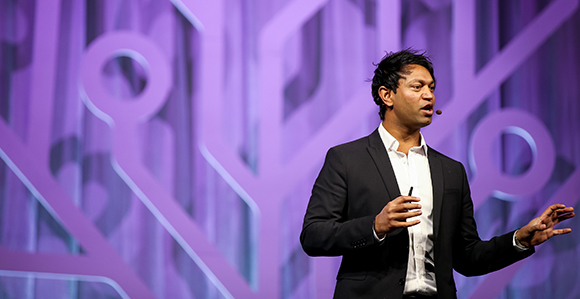Saroo Brierley Speaks on Finding His Family and How to “Soldier on” with Hope at RootsTech
Contributed By Emmy Gardiner, Church News staff writer

Saroo Brierley gives a keynote address at the RootsTech family history conference at the Salt Palace in Salt Lake City on Friday, March 1, 2019. Brierley lost contact with his family as a young child in India and was raised by an adoptive family in Australia before later reconnecting with his biological family.
Article Highlights
- Saroo Brierley never gave up on finding his family after he was separated from them as a 5-year-old.
- Having hope is important when facing trials and questions.
- Brierley said his journey to find his birth mother was a spiritual one.
“It was so easy to give up. My friends were telling me, ‘You should give up, Saroo. That’s in the past.’ But in order for me to go forward, I had to go back.” —Saroo Brierley, RootsTech keynote speaker
Related Links
Saroo Brierley, whose life was the inspiration for the 2016 Oscar-winning film Lion, was a keynote speaker at RootsTech in Salt Lake City on Friday, March 1. While addressing a packed audience, he described his life as “a story of hope” and said that after many trials and tribulations, “miracles can happen.”
Twenty-nine years ago, at the age of 5, Saroo left his slum suburb in India and followed his older brother to a local train station. After falling asleep on a bench at the train platform, Saroo became separated from his brother. When he woke up, his brother was nowhere to be found.
Confused, the 5-year-old Saroo decided to board the train in front of him, which eventually landed him at a bustling train station in Calcutta.
“It dawned on me that I was lost, and I started to cry … and fell to my knees,” Saroo said. “[But] the great thing about human beings is that when we do fall on our knees … we learn to pick ourselves back up.”
After deciding to leave the train station, Saroo spent weeks wandering. From almost drowning in a river, to nearly being taken prisoner, Saroo ended up at a local police station where officers started to advertise his name in the local paper. There was no response.
Saroo was then turned over to ISSA (Indian Society of Sponsorship and Adoption), where he stayed for a few months before being put up for adoption.
Within weeks, Saroo was flying across the world to Australia, where he was adopted by Sue and John Brierley. He remembers meeting them for the first time at the Melbourne Airport.
“I had this massive block of chocolate in my hand and it was dripping on the floor. … My adopted mother got a tissue out of her pocket and [wiped my face] and gave me a teddy bear,” Brierley recalled. “At that point, the [connection] between mother and father and son was created.”
Though Brierley loved his life in Australia and felt fortunate to have been adopted by such loving parents, there was still a nagging void in his heart.
“As time went on, I never forgot about my past. I had this feeling of nostalgia, the feeling of being stuck between a rock and a hard place,” Brierley said. “I often thought, ‘Is there ever a way of finding my family?’”
Finally, in his early 20s, Saroo decided to do something about it. He started compiling information detailing everything he could remember from his hometown: were there hills, mountains, rivers? What kinds of animals were there, what kind of cultural events?
With the help of Google Earth, Saroo finally had a breakthrough in his years-long search. He was looking for a train station in India with a water tower on the left, a ravine further on, a bridge, and a train station on the right-hand side. Saroo described it like trying to “find a needle in a haystack.”
“I zoomed in on this train station and it looked exactly the way I remembered it,” he said.
Saroo had finally found his home, but it wasn’t without sacrifice.
“It was so easy to give up. My friends were telling me, ‘You should give up, Saroo. That’s in the past,’” Brierley said. “But in order for me to go forward, I had to go back.”
With that, Saroo hopped on a plane to Khandwa, India, and when he returned to his hometown, it was like he never left.
“The muscle memory in my legs decided to follow a path, and within about 30 minutes I was standing outside the house where I was born.”
Saroo was reunited with his mother after 26 years of searching. In a subsequent 60 Minutes documentary, Saroo’s biological mother and his adopted mother met for the first time, something he will never forget.
“I’m so privileged to have two mothers, a mother that gave me birth to a mother that gave me a second chance in life,” he said.
“The fusion elements of hope, determination, sheer grit, and being fierce is how I managed to do what I did. I took a chance and created a difference.”
In a Q&A after the presentation, Saroo couldn’t emphasize enough the role that hope and spirituality played in his journey.
Saroo noted that when his biological mother wasn’t around, he spent a lot of time with a religious leader in his village named “the Holy Man.”
“He had a massive influence on me to value nature and spirituality,” he said. “[I can’t deny] that this [story] has massive spirituality in it.”
He continued, “Never give up hope. … If you lose hope, you lose everything. I never lost hope; I soldiered on.”

People listen as Saroo Brierley gives a keynote address at the RootsTech conference at the Salt Palace in Salt Lake City on Friday, March 1, 2019. Brierley talked about the importance of soldiering on with hope in the face of trials. Photo by Spenser Heaps, Deseret News.
